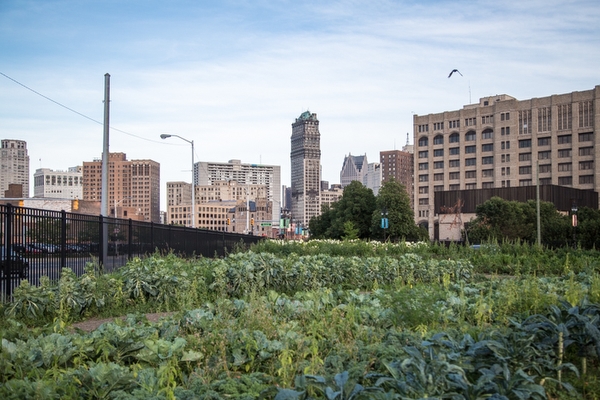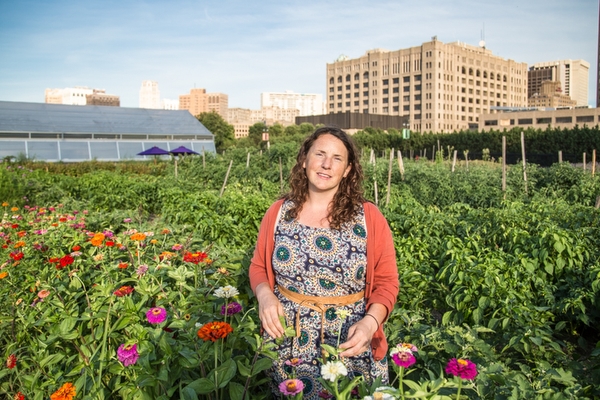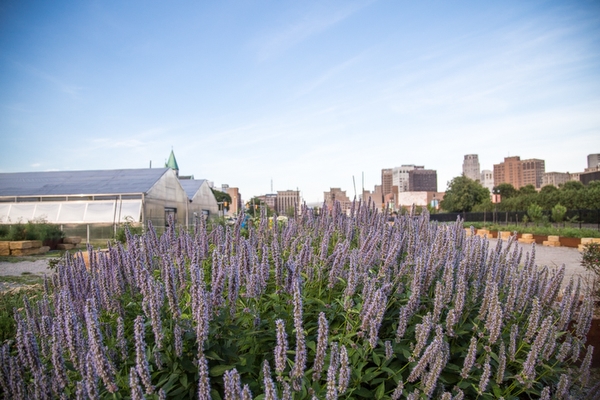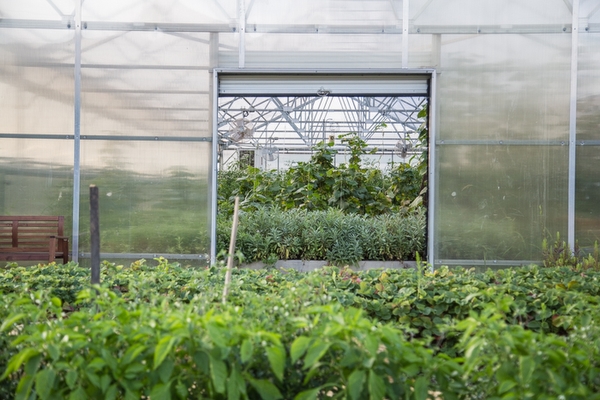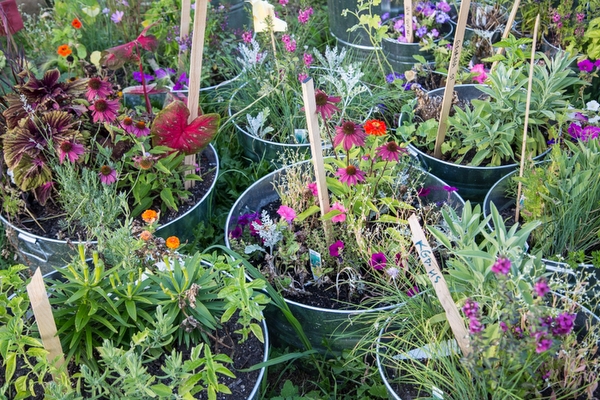Looking back on a decade of growth in Detroit’s urban ag movement
As we celebrate a decade of publishing in Detroit, we look back on the growth of the city's urban agriculture movement in recent years.
The last decade has been a bountiful time for farming in the Motor City.
That’s not to say that idea of planting seeds within city limits sprung out of the ground just yesterday. Urban agriculture has a rich history in Detroit that includes Hazen Pingree’s pioneering potato patch plan of the 1890s, victory gardens during World War II, and the Farm-A-Lot program initiated in the 1970s. But the time since Model D planted its flag on the city’s media landscape has been one of growth and new possibilities.
With many years’ experience on the scene, Ashley Atkinson, a co-director of Keep Growing Detroit, has seen a flourishing of the city’s farming movement firsthand. Her organization oversees the Garden Resource Program, which provides material support and expertise to gardeners in Detroit, Hamtramck, and Highland Park, as well as runs Grown in Detroit, a program that helps local farmers sell their produce.
The Garden Resource Program got rolling in the early 2000s, with the support of now defunct coalition called the Detroit Agriculture Network and the leadership of a group of farming elders known as the Gardening Angels. It came about as a response to the waning of the city-sponsored Farm-A-Lot program, which had offered free seeds and tilling assistance to residents.
Participation in the program has blossomed over the last decade.
“2004 was the first full-functioning year,” says Atkinson. “We had 80 gardens in the network at that time… Today we support a network of about 1,400 gardens and farms, and there are nearly 20,000 Detroiters engaged in some capacity at those farms.”
Although she notes that the rate of growth has slowed down in the last few years, The Garden Resource Program’s membership is still climbing. Atkinson attributes the popularity of gardening in Detroit to the experiences of city residents who may have been raised on a farm or had relatives that farmed, as well the attractiveness of gardens as a remedy to problems associated with vacant lots. First Lady Michelle Obama publicly embracing gardening hasn’t hurt either, she adds.
Farming’s appeal has been pretty broad, too. Detroit’s farmers cut a wide swath with respect to age, income, education, race, gender and abilities, says Atkinson.
“It’s a very, very, very diverse community, especially when compared to the city as a whole, with all the segregation that exists here and the lack of diversity on some levels,” she says.
Planting and growing hasn’t just been embraced at the grassroots level in Detroit, according to Kami Pothukuchi, a professor of Urban Studies and Planning at Wayne State and director of SEED Wayne, a program dedicated to building sustainable food systems.
“Urban agriculture has very systematically integrated into practically every community sector,” she says. “So big employers are thinking about it as a use of land and…a way into connecting with the community.”
Examples of larger-scale projects include Compuware’s Lafayette Green gardens, school farms, and MGM Grand Casino’s Plum Street Market Garden. The range of operations in Detroit includes backyard plots, big production gardens, projects designed to provide training or reintegration for residents returning from incarceration, community supported agriculture enterprises selling food out of boxes, and more.
Growing methods have also grown more sophisticated, both in terms of planning and season-extending technologies like hoop houses.
Gardening gains and growing pains
The flowering of urban agriculture in Detroit didn’t happen overnight. For one thing, the abundant space for farming that exists in Detroit is a consequence of deindustrialization and depopulation, processes that have unfolded over decades.
While acknowledging the important groundwork laid by Farm-A-Lot, SEED Wayne’s director gives a lot of credit for the city’s agricultural resurgence to the community-building work of the Detroit Agriculture Network (which was picked up later by the Garden Resource Program Collaborative) and the precedent set by projects like the Capuchin Soup Kitchen’s Earthworks Urban Farm, a 2.5-acre organic farm that started in 1996.
The last decade has also been a period of deepening awareness of the relationship of food to issues of social and economic justice. The Detroit Black Community Food Security Network, in particular, has been leading the way for this process.
The group formed in 2006 “to address food insecurity in Detroit’s Black community, and to organize members of that community to play a more active leadership role in the local food security movement.”
DBCFSN currently operates a two-acre farm at Detroit’s Rouge Park. It has also played an active role in the public sphere, developing a food security policy for Detroit that was adopted in 2008.
Along with Earthworks Urban Farm, Pothukuchi says DBCFSN also initiated an important community conversation aimed at dismantling racism in the food system in the late 2000s, which raised topics like the poor treatment of African Americans in local grocery stores and the scarcity of employment and business opportunities for members of that community in the food system.
“They deserve a lot of credit for bringing these issues to the forefront of the discourse on urban agriculture and sustainable food systems,” she says. “Because of their leadership, we’re now talking about sustainable and just food systems.”
One of the most contentious issues to arise in the city’s farming community during the last decade was a plan by financial services magnate John Hantz to create the “world’s largest urban farm” on Detroit’s East Side.
First made public in 2009, the proposal underwent a radical reconfiguration before being approved by Detroit City Council as urban tree growing operation called Hantz Woodlands in 2012. Supporters saw it as an answer to blight, but detractors raised eyebrows at the city’s sale of roughly 140 acres at around $0.08 per square foot. The episode highlighted concerns in the urban ag community that the city was favoring wealthy elites over grassroots farmers on land acquisitions.
The last several years have also marked some big losses for Detroit’s food growing community. In 2011 the Birdtown Community Garden in Detroit’s Cass Corridor neighborhood was shut down when a neighboring business purchased the city-owned land it inhabited in order to expand. Its closure was followed in 2014 by the shuttering of Catherine Ferguson Academy, a school for pregnant girls and teen mothers that drew widespread praise for its urban farm.
No discussion of the last few years would be complete without mentioning Detroit’s urban agriculture ordinance, which was passed in 2013. The passage of the zoning legislation was a watershed moment for Detroit because it recognized urban agriculture as a legally permitted activity.
Although it’s hard to tell if the legislation will turn into a bureaucratic headache down the road, Pothukuchi says for the moment the ordinance is significant because of the confidence it gives farmers.
“It gives a stamp of legitimacy,” she says. “It allows investments to grow operations. It brings certainty in the field.”
Detroit’s agri-future
Despite the growth Detroit’s agriculture over the last decade, there are still hurdles for grassroots farmers.
Mark Covington launched the Georgia Street Community Garden with a collective of friends in 2008. While the group now runs three flourishing gardens and a community center, Covington says the situation of the average farmer hasn’t changed much since they first began cultivating their east side lots.
“We’re still struggling for resources, especially the nonprofit community gardens against the for-profit community gardens,” he says. While there have been attempts to bring about greater cooperation between farmers, Covington says that competition still exists for everything from grants to compost.
Asked about the future of urban agriculture in Detroit, Covington is hopeful that city council will approve an ordinance legalizing livestock. He’s also cautiously optimistic about its economic possibilities.
“Hopefully it will be able to get a little bigger, and people will be able to start creating some better jobs,” he says.
Looking forward, Pothukuchi is intrigued by the emergence hydroponic and aquaponics operations and the use of season-extending technologies by farmers focused on cultivating businesses.
“There are a lot of lessons to be learned in terms of how they make that happen,” she says.
At the same time, she wonders about the extent that foundations and corporations will continue to support farming operations here in the long run. Without their support, the Wayne State professor believes it will be difficult to sustain Detroit’s agricultural sector, a possibility that merits some soul searching from consumers.
“We are so accustomed to having our food so cheap, because it comes from such faraway places that are very heavily subsidized for water and labor,” says Pothukuchi. “We need to really be educated on why we should be paying more for the food that urban agriculture provides and pay happily for it!”
Editor’s note: This article is intended to be a brief overview of what’s been happening in Detroit’s urban agriculture scene, not a comprehensive history.
This story is the latest in Model D’s “10 Years of Change” series celebrating our decade of publishing in Detroit. Read other stories in the series here. Support for “10 Years of Change” is provided by the Hudson Webber Foundation.
All photos by Marvin Shaouni.
